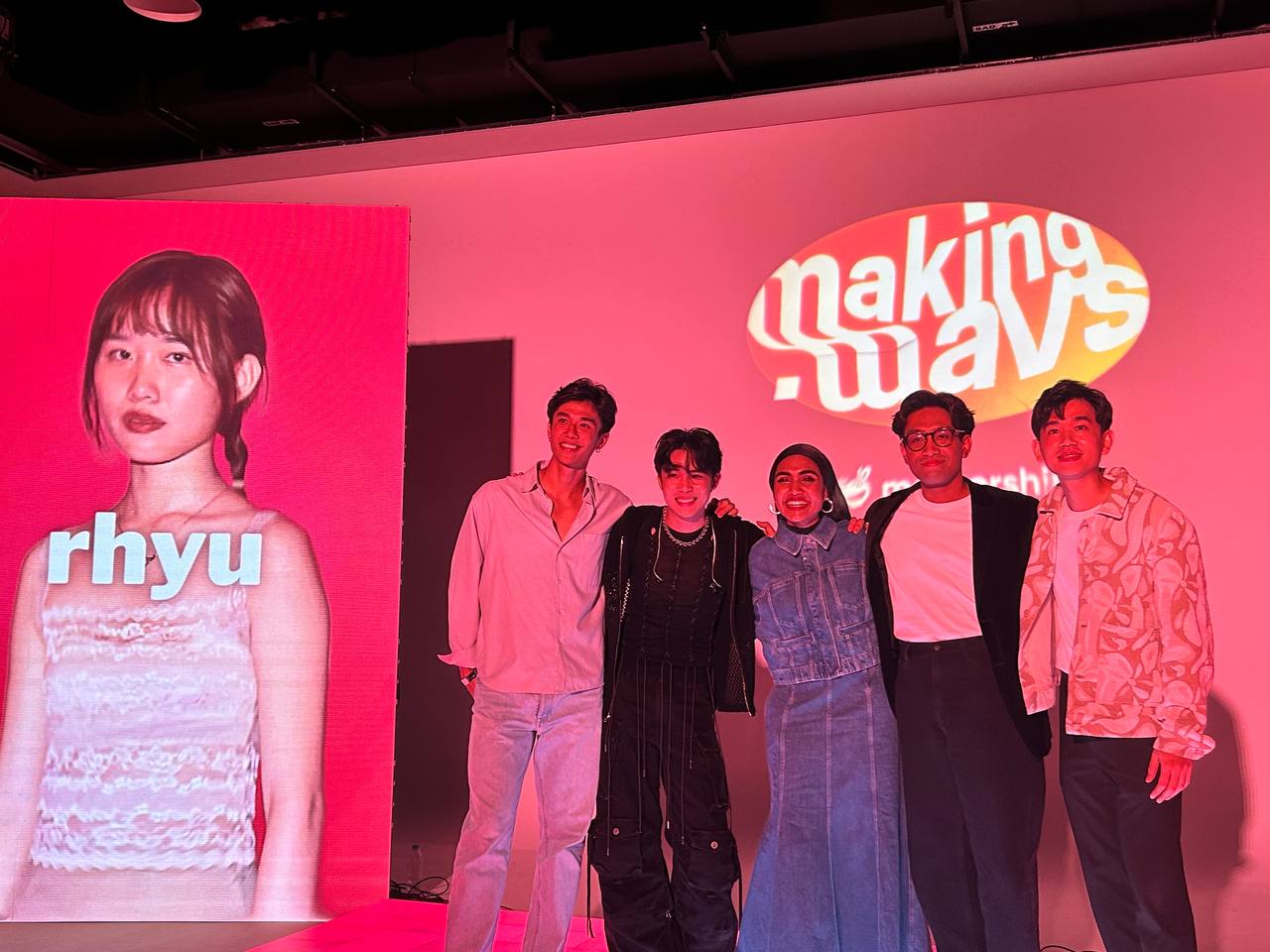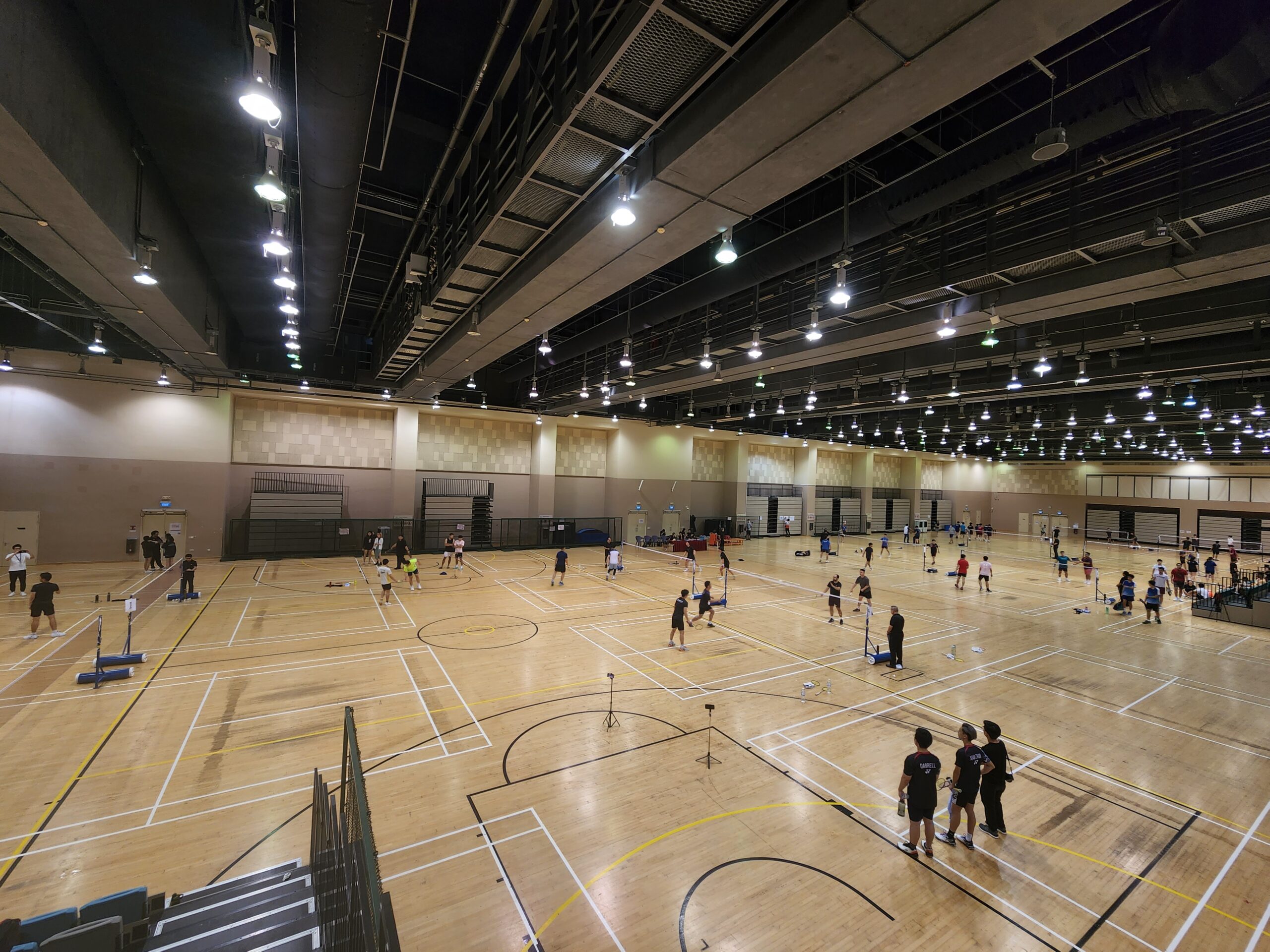The burnt, musty smell of cigarette smoke and exhaust fumes from passing lorries lingers in the air as you make your way into the area. Continuing on, you start getting a clearer sight of the coffee shop, where there will usually be a few workers sitting at the tables to take a break from the day’s labour. Not long after, rows of grey buildings and a few parked vehicles that line them greets your eyes.
The environment of this industrial park nearby Kaki Bukit MRT looks similar to any other. The only difference is that you may occasionally spot a few people carrying guitar bags on their backs and perhaps others lugging pieces of equipment. What could they be doing with their instruments in such a quiet industrial place like this?
Tucked away between automotive shops and electronics supplier businesses hangs a sign above lift doors, warmly illuminated by small lightbulbs. It reads: “Treble Cube Productions”.
Taking the lift to the third floor, the scent of paint from its interior hits your nose. Soon, a faint ring of music greets you and a tight walkway leads to the band rehearsal space, better referred to by patrons as a jamming studio.
Those who rehearsed at the studio may know 31-year-old Hanesh Manoharan, the down-to-earth founder and owner of Treble Cube Productions. Despite having to close the doors to live performances at Treble Cube in October last year due to numerous neighbour complaints, the spirited owner still sees a bright future for his passion.
Manoharan and his former girlfriend, Denise, are musicians themselves and ventured into the idea of opening their own jamming studio in 2019, right before the pandemic hit. The aim was to provide others with an outlet since other similar studios were closing down.
The dedication to Manoharan’s passion and business shines through even in the tiniest of details to provide musicians with a one-of-a-kind experience, from the type of equipment he provides to the convenience of a fully automated system.
WHEN MUSIC HARMONISES WITH IT
Before Treble Cube became the studio it is today, Manoharan pondered a way he could meld his background in information technology (IT) and his love for music together. This was how he came to the idea of creating an automated jamming studio experience, a goal he describes as a “service that patrons cannot find elsewhere”.
“I fuse my passions, my music and IT — so I combine them together and have Treble Cube, a fully automated jamming studio,” explained Manoharan.
For a place whose main elements and purpose are music, you would not expect it to involve so much IT work. With his studio being automated, it means Manoharan does not have to be there 24/7, all thanks to coding and technology.
On days at home, he works on backend tasks like improving the studio’s system, testing digital functions to implement in jamming rooms and tweaking the web application for those functions. He uses a coding language to write information into his network of connected computing devices and a cloud system to function the features in his jamming studio.
One feature would be the randomised six-digit PIN code you must enter to access the room you booked. Another useful one would be Treble Cube’s web application, which can be used to do a multi-track recording of your session and have the audio files sent to your booking email for personal use.
Details like these may seem like a norm if you visit the studio often, but they still provide great convenience and efficiency at every step. The amount of effort Manoharan puts into making Treble Cube unique is truly evident, and the most commendable part of this is that he does all this out of pure interest.
Without any hesitation, Manoharan expressed: “I would say Treble Cube is more IT than music.”
ELECTRIFYING GIGS AND UNDERGROUND BANDS
Treble Cube is currently made up of three jamming rooms: two smaller rooms and one big room that can comfortably fit up to 70 to 90 audience members. The latter is known as Room 3 and it has played host to numerous shows of different alternative genres.
From hardcore to mellow indie shoegaze, Room 3 has given opportunities for the local alternative and underground music community to come together and have fun by supporting the acts playing on stage. It is almost therapeutic for showgoers when they feel the music’s vibrations thumping in the hollows of their chests.
Events like these are a reminder that live gigs are back in full force and music lovers may be more enthusiastic than ever since new shows are being announced more often. This is contrasting with the cancelled or scaled-down events in 2019 and 2020 where ticketed attendance at performing arts events fell from 1,991,950 to 181,217 respectively as told by statistics from the Ministry of Culture, Community and Youth (MCCY) website.
At Treble Cube’s lively gigs, Manoharan would be there in person to make sure every part of the event goes smoothly. He has to sacrifice his time to come down to the studio to facilitate every show, but he does not mind doing so. Opening Treble Cube had allowed Manoharan to discover many unknown musical talents in our midst.
In an amazed tone, he smiled and praised: “Singapore got so many talents that I didn’t even know of.”
Manoharan faced his fair share of challenges when Treble Cube held shows in Room 3. He revealed an incident when a showgoer accidentally broke a wooden support that held a stage monitor, but he kindly brushed it off as he recounts the story. However, the more crucial obstacle lies in how he had to keep within the boundaries of laws and regulations.
According to the Urban Redevelopment Authority (URA) and a classification known as Business 1 (Industrial), there are specific categories of the kind of uses for industrial areas. One of the approved categories is named Core Media. Its list of permissible activities includes studio production, location production and audio recording.
To adhere to this, Manoharan would allow shows to proceed on the premise that it would be a recorded production. For each gig, he would ensure that audio or video would be recorded while the bands played.
With this solution, Manoharan’s space could continue functioning as both a jamming studio and a gig venue. However, after less than a year of welcoming live performances, Manoharan announced on Instagram that the studio would be bidding goodbye to Room 3.
THE TROUBLE WITH NEIGHBOURING UNITS
When news broke, it was no surprise that the Treble Cube’s supporters and patrons shared bittersweet emotions in the comments section of the post. The announcement was written with rhymes and reminiscences as Manoharan thanked showgoers, bands and crew members for bringing such life to Room 3. He also gave a teaser of what is to come of the studio.
Still, one question was not answered: Why is Room 3 closing? Fortunately, Manoharan clarified that it was not because he ran into any trouble with the law. Instead, it was his personal decision that led to it. Besides being a precautionary action to avoid legal issues, he revealed that it was due to multiple complaints from neighbouring units and businesses.
Before Treble Cube’s Room 3 was available as a show venue, Manoharan would frequently get noise complaints from other workers. Some would go to Manoharan’s landlord to put them on the phone with the former, while others would take the upfront approach of knocking on his door.
Manoharan revealed that he once received a noise complaint at a time when no one was even at the studio. With his laid-back personality, he simply let out a quizzical chuckle at the thought of this incident. Luckily, his landlord also shared the same puzzlement and was always understanding of Manoharan’s struggles with the complainants.
Things changed when Room 3 started having shows, but not for the better of the complainants. After shows, trash would be spotted in different parts of the area — cigarette butts and beer bottles could be seen around the first floor of the industrial building.
“Places we didn’t think the trash would be at, it was there,” said Manoharan, referring to how trash would unexpectedly be found in nearby lorries of neighbouring businesses.
Multiple complaints about litter became more regular even with him sweeping the area by the road with his broom. Despite placing trash bins at Treble Cube, people would still find ways to litter. Although four different units were sounding their discontent, Manoharan reasoned that he would still be forgiving to showgoers who unintentionally failed to discard their trash appropriately.
He understands that some people just wished to return home as soon as possible and may be reluctant to go out of their way to find a trash bin. However, Manoharan made it clear that he may not spare his sympathy for those who intentionally vandalised the area.
Not wanting to tempt fate with each complaint, as well as the constant pressure by the community of nearby businesses, Manoharan decided to close Room 3 and stop hosting shows at his venue. When asked how he felt about it, he shared an optimistic answer that he believes more opportunities are waiting for him in the future.
Manoharan just wishes that people like his complainants would be more understanding of showgoers and the lesser-known local alternative music community in general.
“Accept that everyone is just having fun and we all have our own place to vent out our… just vent out your stress and everything,” he commented.
FROM CUSTOMERS TO COMPANIONS
Manoharan’s passion project is a one-man show, so he is grateful for the support he has been receiving since day one. Having met many patrons from the underground scene through Treble Cube, some of those individuals have become great company for him.
Those customers gave him endless support for his passion and played a vital role in his journey. Manoharan explained that in the the early days of Treble Cube, his friends Jian Liang and Jian Ming from Aeonix Productions helped him to do analytics of the jamming rooms to improve the sound acoustics. They even introduced him to certain equipment he did not know of at the time, which he now exclaims that they were game-changers for the studio.
Syamsul Bahari, 29, from the local pop-punk band Circline Line Kid, visits Treble Cube as often as three to four times a week to spend time with the friends he has made there. Initially just a regular patron rehearsing there with bandmates, one of whom is mutual friends with Manoharan, he began to form a bond with the Treble Cube owner. As time passed, Syamsul soon became a reliable friend who would help Manoharan with organising shows and offer him advice.
In a virtual interview, Syamsul talked about how Treble Cube has impacted the local alternative music scene; he opined that it gives people an outlet of inspiration from the past shows, especially for the show attendees.
Knowing about the few complaints Manoharan had received about littering, Syamsul emphasises how crucial it is for not just show organisers to be responsible but the showgoers and bands too.
“As much as it is good to have shows, you have to be smart. You don’t want to perform and not care about the space,” he said.
Syamsul went on to acknowledge Manoharan’s hard work, dedication and passion for Treble Cube. He also described him as a good mascot and spokesperson for what he does for the local alternative music scene.
“Whatever Hanesh is doing, I just feel that he needs to keep on going,” encouraged Syamsul.
He also hopes that more people in Singapore will give local alternative music a chance and become fans of the bands organically.
WHERE DO WE GO FROM HERE?
This is not the end of Manoharan’s passion project and business. Manoharan eagerly shared with us how he will be converting Room 3 into two separate jamming rooms with newer, better equipment and instruments.
Pacing around Room 3, he showed how he envisions the room being split in two. His actions and words showed his motivation towards his future. Hoping to appease his neighbours, Manoharan also plans to improve the soundproofing for all rooms so businesses can continue peacefully for everyone.
Besides the renovations, he wants Treble Cube to still be in the business of a live show venue but also confessed that he cannot just survive on it being a gig space alone. Instead, Manoharan wishes to have a space where he can have a live performance venue that includes a pub, so the space does not stand quiet on days when there are no shows.
Having high hopes for the future of Treble Cube, Manoharan’s desire to succeed in his passions gives him the motivation he needs. He recounted a time when he mustered up the courage to begin his Treble Cube journey, he felt dejected when a friend shared their uncertainty about the success of his venture. Nonetheless, with a bright smile, Manoharan offered us the encouraging words he told himself then: “If you believe in it, just do it. Then I did it, I went all out.”
The energetic person behind Treble Cube Productions is living proof that everyone starts somewhere and that sometimes, our passions do pay off. Even with complaints and a halt to live performances, Manoharan did not sound discouraged as he shared his thoughts.
In an ever so simple manner, he remarked: “When the door closes, two more open, man.”






